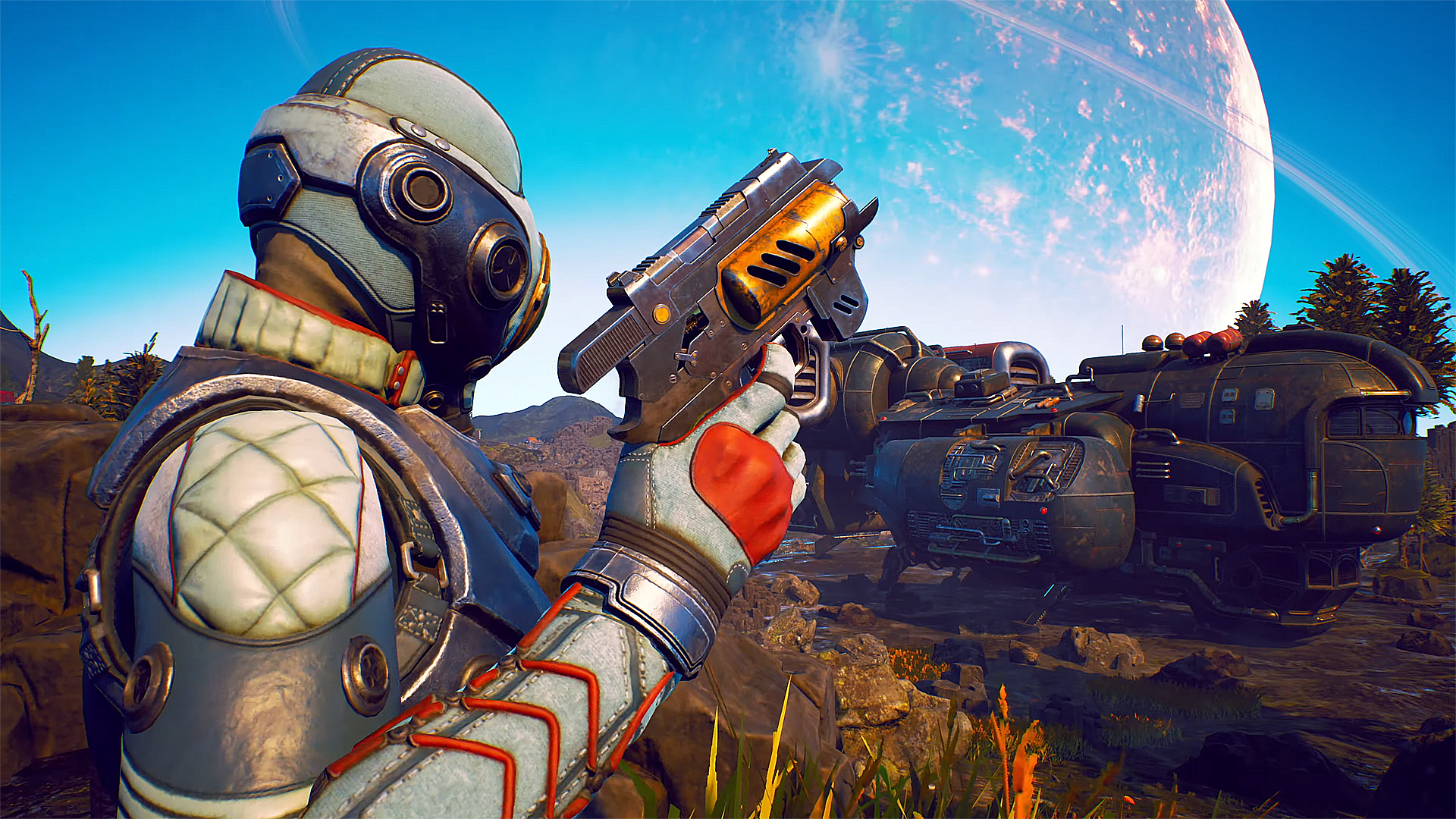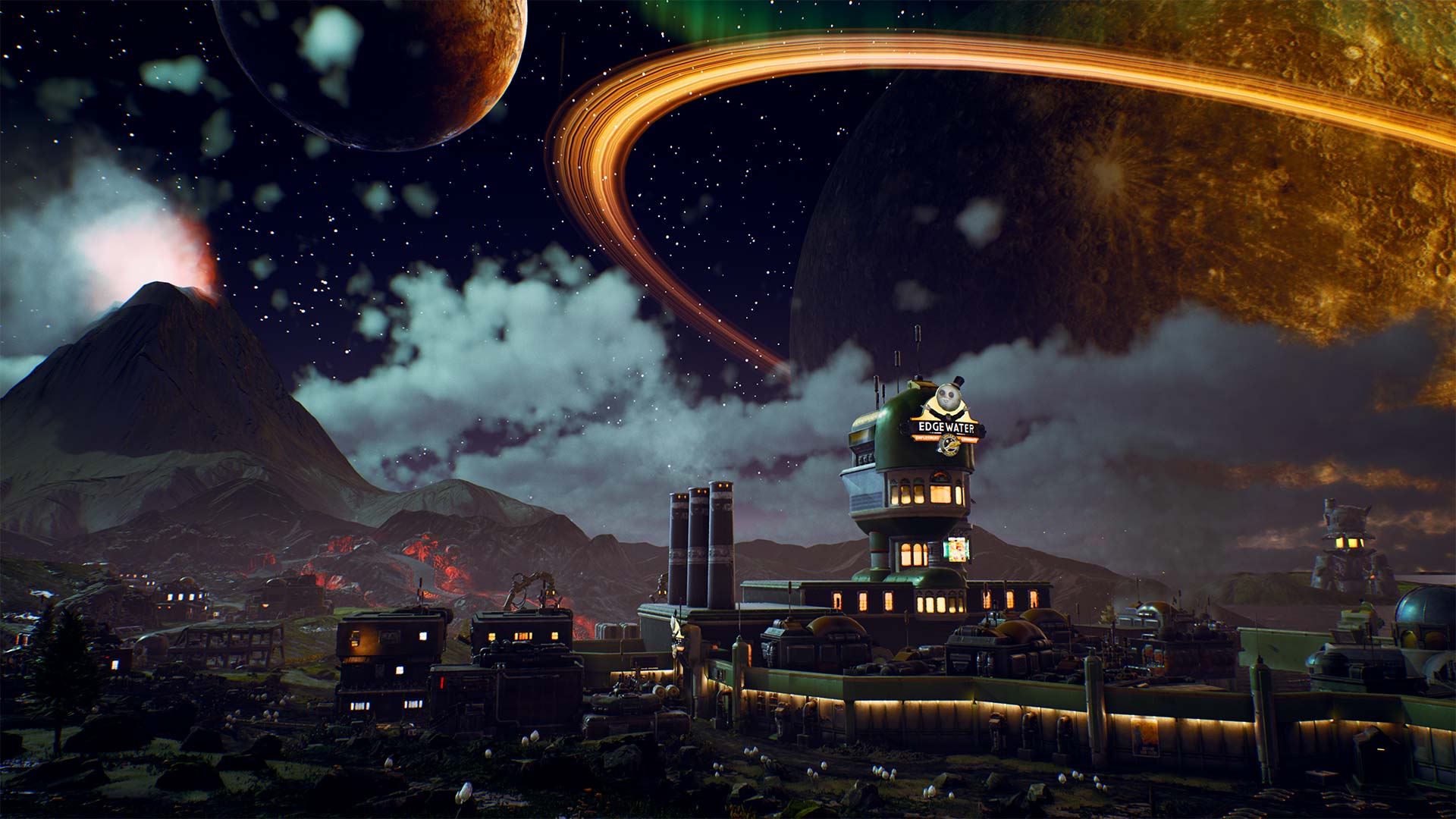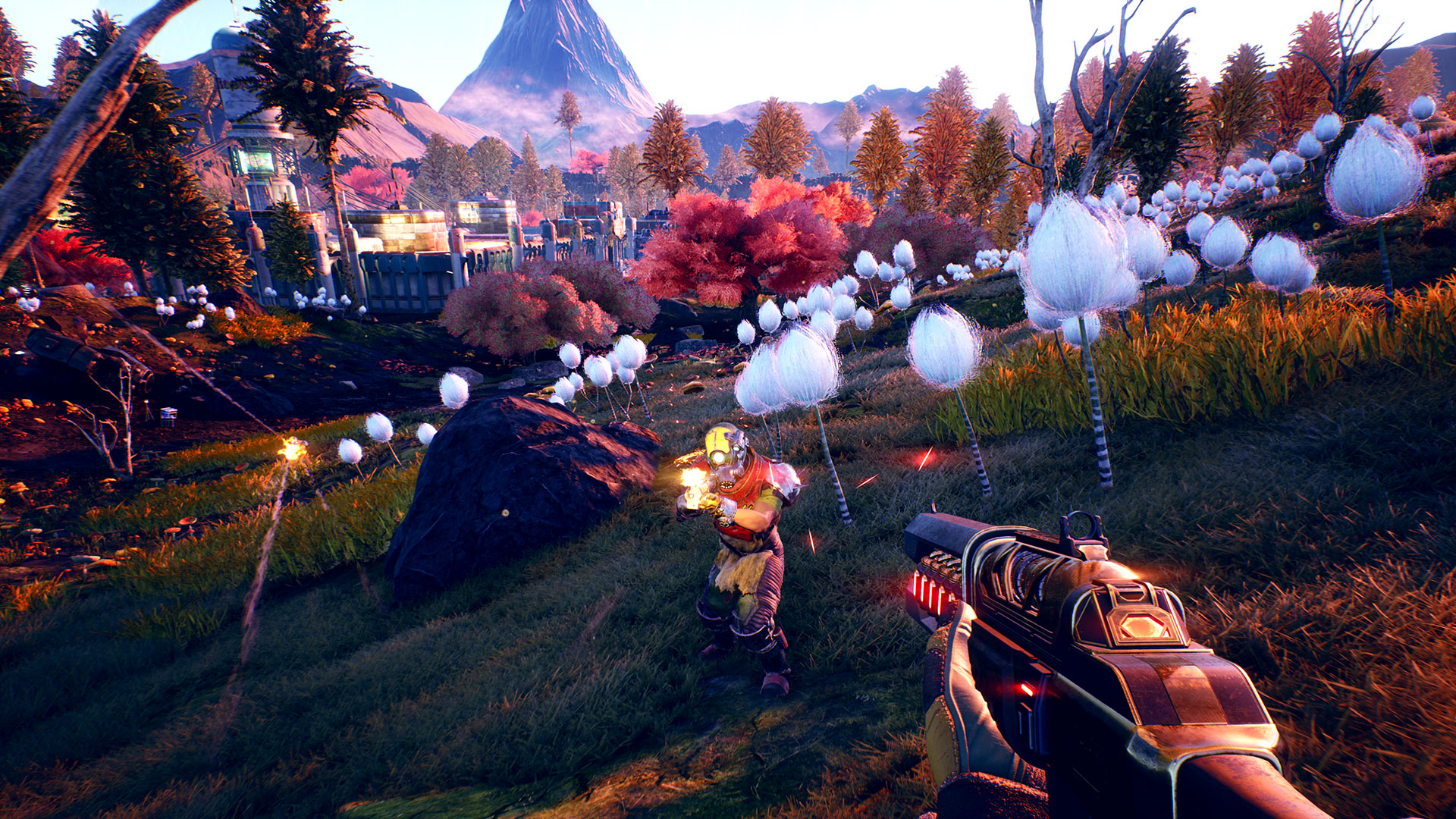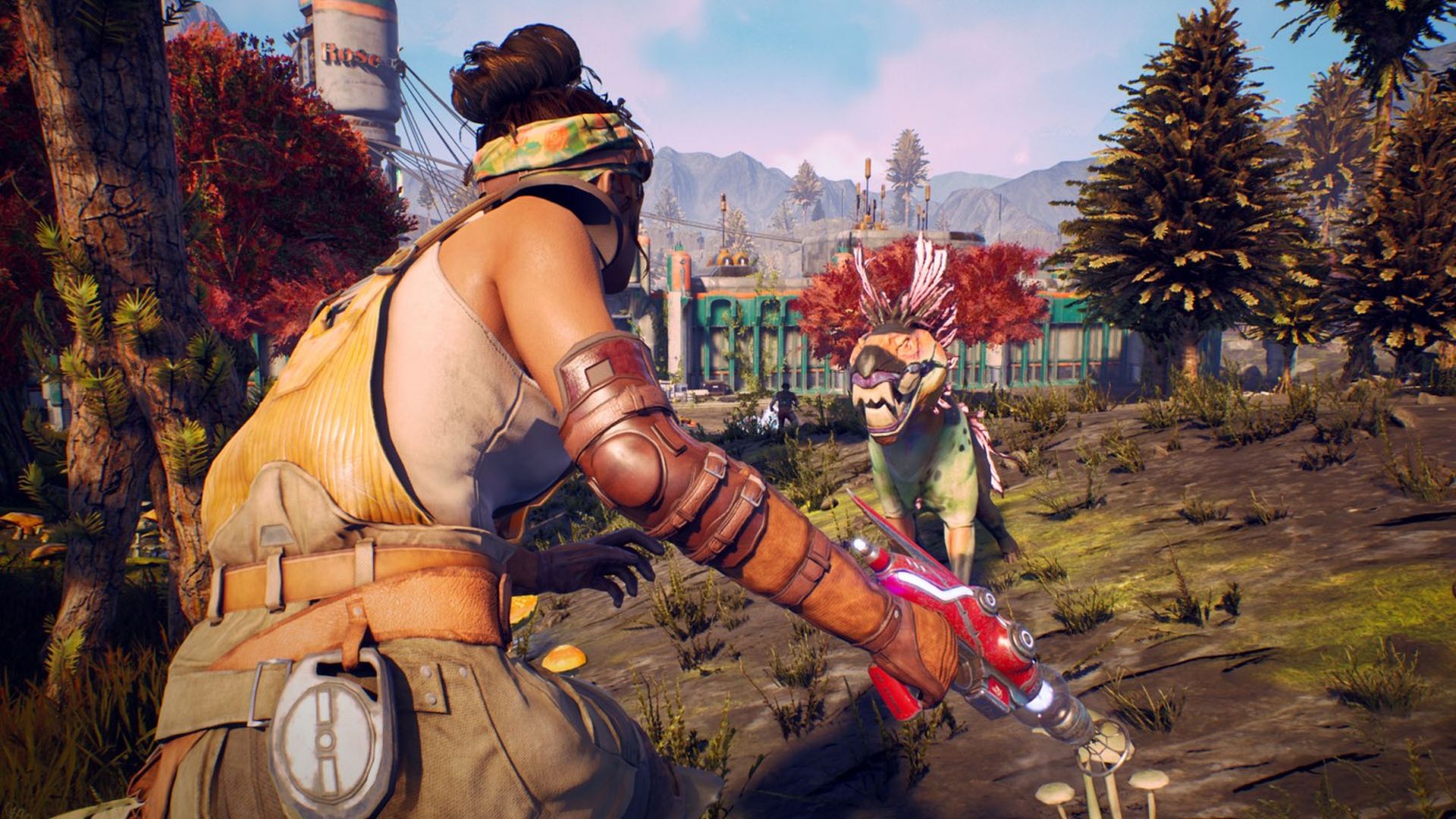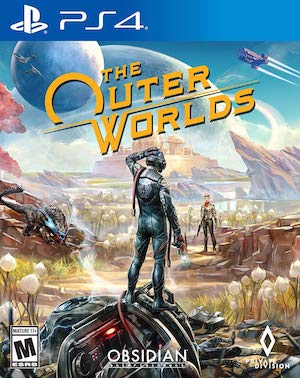
The Outer Worlds is a classic case of a video game squandering its potential. It’s a generic role-playing game that works very well when it knows what it’s supposed to be doing, but at other times it simply doesn’t know when to take itself seriously. It’s not a big surprise that The Outer Worlds derives a few things from Bethesda’s Fallout series, and like those games, the story begins with you waking from cryosleep and getting to meet a completely weird scientist, Phineas Welles. The establishment is now being ruled by big corporations, and capitalism is the name of the game, and apparently our crazy scientist isn’t really happy with how all of this is going. He wants to incite a revolution, so that the colonies of humanity in this different galaxy can be freed from the clutches of the overseeing organization, the Board.
"The Outer Worlds is a classic case of a video game squandering its potential."
The premise is pretty uninteresting, and as you progress through the game, you will likely not even care about the bigger picture. After all, it’s just about shaking up the universe and getting help from the various colonies. So, the story is nothing to write home about- but what about the worlds themselves? Undoubtedly, the world design and the art accompanying them are easily the strongest points of the game. There is an excellent variety in the kind of areas you will explore; each location has multiple colonies that players can traverse, and although they aren’t as big as, say, Fallout 4, their compact size makes them easy to navigate.
Much praise has to be showered on the game’s choice of color palette as well. As mentioned earlier, each colony is designed uniquely, but what sets them apart from each other is the way all of them have their own individual identity, thanks to some stellar color choice and the characters that reside within them. The Outer Worlds truly excels in delivering a colorful and a wide array of both, serious and downright crazy folks, whom you will remember for a very long time.
However, even though the NPCs can have interesting things to say to you, the dialogue options that the game provides to the player can often feel too light weight. Consider this interesting case. I had to access a bloke’s office, which had pivotal information about a story thread in the game. Obviously, I just can’t smash the office’s door and get what I need. What the game does in this case is, simply put, stupid. I just need to visit the person who is looking after the bloke’s office, select the appropriate option, and the poor guy will simply hand me over the keys. This is despite the fact that he is supposed to not let anyone access the office. And what does the game do? It allows a complete stranger with guns to have access to the office without any sort of consequence. Sequences like these can be termed as funny or satirical in the sense that people can be dumb at times, but this particular set piece wasn’t even funny. It was downright unrealistic and absolutely jarring. In short, although the quality of dialogue can be great, the actual choice and consequence mechanic behind it can be hilariously stupid at times.
"Much praise has to be showered on the game’s choice of color palette."
Much has been said about the game’s role-playing mechanics and progression system, however on closer inspection it feels very much similar to what we had in Fallout 4, except with a couple of differences that I will talk about in a bit. The skill system is divided into a number of main categories like Melee, Ranged, Defense, Dialog, Stealth, and others. However, they also have sub skills. So, the main skill category, say Dialog, is divided into Persuasion, Lie, and Intimidate.
Ideally, each sub category should also be allowed to have its own individual leveling up mechanic. However, The Outer Worlds does things a bit differently by leveling all three sub-skills with a single skill point, at least until you reach level 50 for each of them. So, if you want to upgrade Dialog, you simply invest one skill point and it will level up Persuasion, Lie and Intimidate sub-skills as well. I found this system to be quite weird, as it defeats the purpose of having a sub-skill category to begin with, at least until you reach level 50 for each of them.
However, there are two factors that separate this skill system from others, and it’s the game’s ability to adapt accordingly to your playstyle and allocate you a flaw perk. For example, if you are wary of robots, the game will give you the option to accept robot phobia and weakened stats when coming up against robots, but in return you will get a free perk point. It’s an interesting system that improves the mediocre skill progression somewhat, and adds a bit of emergence to gameplay. The second differentiating factor is that you can also allocate perks to your companions, and the more you have of them, the more engaging of a meta game it becomes. Handling your companions’ various parameters and accordingly seeing the results on the field can be quite satisfying, especially seeing them perform a powerful super move on a difficult foe.
"The flaws system is an interesting system that improves the mediocre skill progression somewhat, and adds a bit of emergence to gameplay."
As you level up, you will also earn perks. There is nothing special about them, as I found them to be your typical run-of-the-mill attributes related to character progression, such as increasing the base health or increasing the walking speed. Initially, these perks won’t affect your character much, but as you progress through the game, some of the higher tiered ones will give you the ability to become pretty powerful during the later sections of the game.
And powerful you will need to be, as enemies can be rather daunting later on in The Outer Worlds. Although lacking in variety, monsters and enemy characters come with different skills, depending on the planet you landed on, and can be quite intimidating. Unfortunately, the AI accompanying them can be quite inconsistent at times. Sometimes enemies and monsters will just stand there and shoot at you without any sort of strategy, thereby giving you a clear shot at them.
This brings me to the combat, which like the rest of the game is yet another mixed bag. Let me get this right of out the way- you will be coming across a ton of weapons and loot in the game. You will have access to saber swords, scythes, electronic plasma guns, machine guns, rifles, and a ton of other mods, which you can use to improve your weapons- or you can just break down your weapons to get additional components for repairing your gear. This all sounds pretty great, right? Unfortunately, the guns don’t feel tight. Granted, I am not expecting a classic first-person shooter experience, but barring the stunning visual effects that come with each shot, guns don’t really handle well.
"Barring the stunning visual effects that come with each shot, guns don’t really handle well."
There is a sense of unrealistic weight to them, which makes them inconsistent to handle. The game also employs a VATS-like system, called Tactical Time Dilation, which allows you to slow down time and reveal enemies’ critical points. Unfortunately, it doesn’t feel as powerful as the VATS system, primarily because it doesn’t give players too much critical information about the enemies- although seeing enemies react to your shots in slow motion while you wallop them is certainly a sight to behold. The UI/Inventory system is fine, it’s nothing special, but at the very least it gets the job done. Items can be easily arranged and thrown out, so, yes, it’s not terrible like a few other role-playing games have.
Quest design is largely the same as Fallout 4 as well, except that some missions may take place across different planets. This is still largely a point A to point B mission kind of a game. You will be accessing indoor environments and fighting outlaws, robots, and monsters, and traverse the open world and take on random encounters. Like any other role-playing game, the critical path is defined by its story-telling, and given that’s largely a mixed bag, the quality of the quests also come off as inconsistent. They can be anything from mediocre to great, and this also remains true for the side missions.
The Outer Worlds isn’t a big budget video game, so I was totally not expecting high-end, state of the art visuals. I played the game on PC and I found the graphics to be serviceable at best, even at maxed out settings. Character animations and facial modelling ranged from terrible to mediocre, lighting quality was mixed, and there was a ton of pop-in during several sequences. Unfortunately, I also ran into performance issues where there were frame rate drops all of a sudden. Suffice to say, The Outer Worlds won’t be winning any awards for its graphics anytime soon.
"The Outer Worlds won’t be winning any awards for its graphics anytime soon."
To conclude, I will repeat what I mentioned right at the beginning. The Outer Worlds is a classic case of a missed opportunity. There are so many things it does right, and so many others that feel unrealistic, or simply don’t feel balanced. If you thought that this will hold you over while the Fallout 76 drama goes on, then I am afraid it won’t. Yes, it doesn’t have any microtransactions, but I am not going to praise a game for doing something it’s supposed to do. Look elsewhere if you are looking for an excellent choice and consequence-based role-playing game. I am sure there are plenty out there.
This game was reviewed on PC.
Great art style; World design is vibrant; Companion progression system is well done; The actual dialogue writing is great; Flaw system is an excellent addition.
Gunplay is mediocre; Choice and consequence system is hilariously bad at times; Main character progression system is weird; Largely forgettable story.









